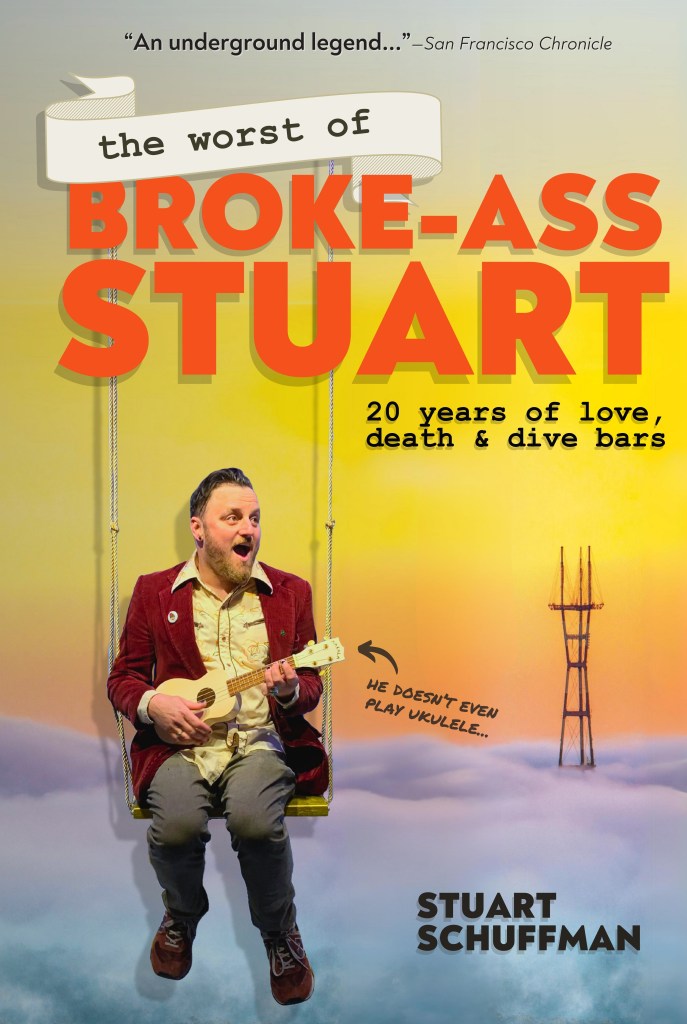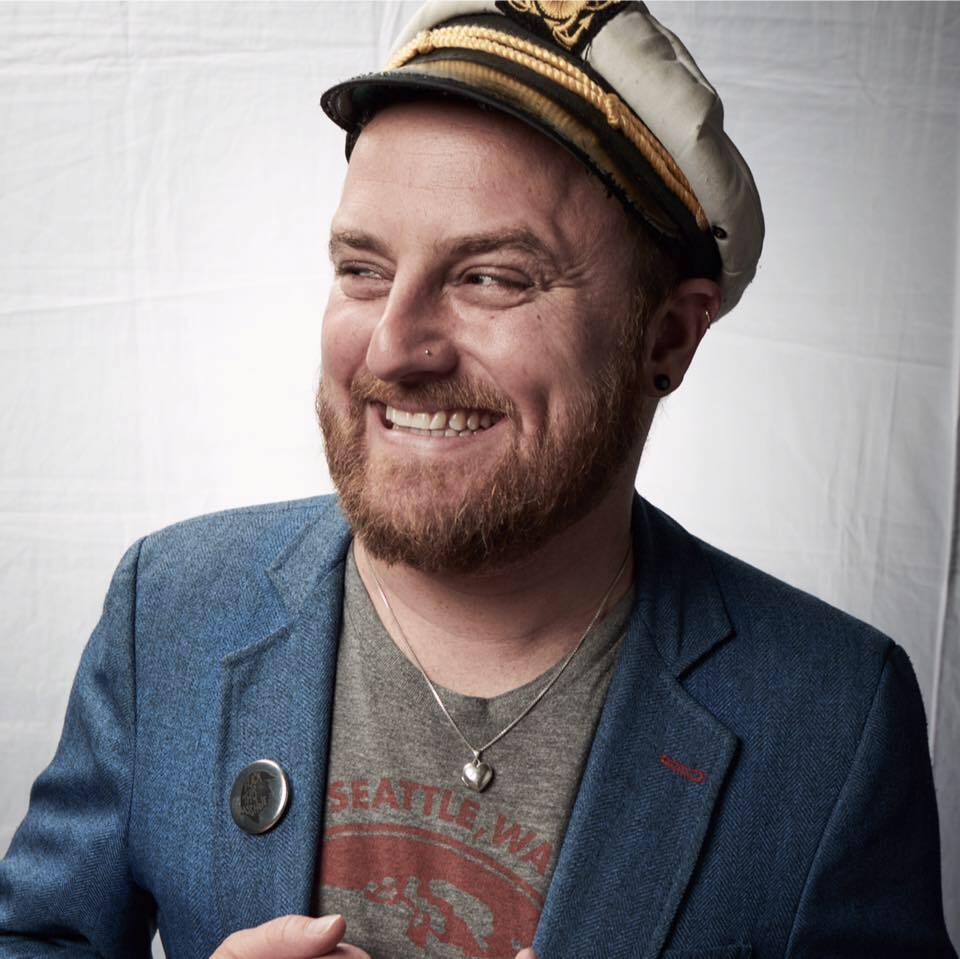This article is adapted from an episode of our podcast, “Civic.” Click the audio player below to hear the full story.
From Mark Twain’s tall tales to Herb Caen’s three-dot social commentary to Armistead Maupin’s “Tales of the City,” San Francisco has a long history of writers who captured the zeitgeist of their generation.
Stuart Schuffman, aka Broke-Ass Stuart, started with a homemade zine, listing cheap eats, drinks and events. Along the way he became a TV travel host, publisher and mayoral candidate.
He became an influencer offline before social media made influencer viable a career choice.
The San Francisco Board of Supervisors declared Oct. 17, 2025, “Broke-Ass Stuart Day.” He celebrated the publication of his new book: “The Worst of Broke-Ass Stuart: 20 Years of Love, Death and Dive Bars.”
I had a chance to sit down with Stuart to discuss his wry, self-deprecating career reflections alongside Public Press reporter Cami Dominguez.
This episode of “Civic” gets personal with Broke-Ass Stuart, a San Francisco cultural and political rabble-rouser.
Mel Baker: Tell me about some of your early life.
Stuart Schufman: I was born in L.A. I moved to El Paso when I was 2, and moved to San Diego when I was 7.
I was at UC Santa Cruz, I didn’t have grades. I was like, the second-to-last class where it was a pass/fail. I was there 1999 to 2003. It was glorious, because I got out just before social media took over everything. So thankfully, there’s very little evidence of my misdeeds.
Baker: What brought you to San Francisco?
The summer between my junior and senior year of college, I was up here for an internship at Bill Graham Presents, which did all the concerts. I met a girl and she was going to school here.
I graduated from college, came right here, like two days later, because my girlfriend was up here, and I’ve been here ever since — with one year in New York in the middle there.
Baker: In 2004 you wrote and published a zine. What was life like for you then?
I wanted to do something. I was working in a candy store in North Beach. Somebody came in from my neighborhood, from San Diego growing up, the woman who’s now my wife. She gave me her business card and it said, “travel writer.” I said, I want to be a travel writer. So I decided to make myself one.
I started making a zine. “Broke Ass Stuart’s Guide to Living Cheaply in San Francisco.” Then I got that in the hands of Lonely Planet, and they liked it. And, boom, boom, boom — I got to be a travel writer! I wrote about Ireland for Lonely Planet.
So you continued slowly building this persona, and you even got to do a TV series for a while.
It was definitely my favorite thing I’ve done so far. I looked at Anthony Bourdain as an example of what I wanted to do.
It was called “Young, Broke and Beautiful.” It was a TV show on IFC. I got to travel around the U.S., exploring the weird and wonderful in different cities. We only did one season, unfortunately. I’m always just a little before my time, because if it came out just a couple years later, it could have been on streaming, and who knows where it could have gone.
Baker: Then you ran for mayor.
Of all the stupid things I’ve ever done, running for mayor was the smartest by far. You know, I got to speak truth to power in a funny, engaging way. It was a spectacle and I had no illusions of winning. I was running against Ed Lee, who had $2 million as a war chest before he even started. I didn’t win, thankfully, because the only way I really could have lost that election is if I won that election.
Baker: It would have been inside the phone booth having a knife fight.
The problem of San Francisco is everybody agrees on 90% of the same thing, so that 10% of stuff we don’t agree on is nasty. You have to separate yourself from the other person.
I think I’m better serving the populace by agitating from the sidelines and getting people to laugh at what’s going on.

Baker: Stuart, you became an influencer before there were influencers. Tell me a little bit about your book.
It’s called “The Worst of Broke-Ass Stuart.” The subtitle is “20 Years of Love, Death and Dive Bars” because I’ve been writing about those things for 20-plus years. And it’s funny, when I started working on it, I was like, “Oh, this will be easy. I already wrote everything, no problem.” Famous last words. It took so long. I had to go through, like, everything I’ve ever written before. Even late-night emails from myself to myself, like, “Don’t forget to write about this,” you know. And I probably missed some things too, but it was a whole ordeal to get, like, thousands of pages of stuff. You go through to get it down to 350 pages.
Cami Dominguez: I’ve been following your Instagram page for a while, so I’m part of that new wave of people who found you through social media. There’s a certain transparency and realness that Broke-Ass Stuart brings to the journalistic landscape that a lot of people want more of. There’s actually been a lot of smaller newsrooms popping up with this idea of inherent progressiveness embedded in the journalism, which is very different from traditional media. So why do you think it’s important to have a place like Broke-Ass Stuart?
Someone has to do it! I think it’s important to speak up for people who don’t always have a voice.
One of the things I’ve been most proud of in my life is getting to use my platform to amplify voices that don’t get heard, and also giving them the opportunity to do it in their own voice. You know, it’s not my job to say what you want to say.
Back in 2014 my friend Shakina, who’s trans, she had a column on my website that was about dating while trans. And nobody was doing that at the time. There’s some queer organizations and queer public news. I was like, we need your voice to be doing this, Shakina.
Even from the very beginning, from my New York City book, we had other writers help — you know, other voices, because it can’t just be about me. I can talk about myself all day long, but not everybody wants to hear that.
Getting to amplify other voices is what I’m here for. And if I can do that through Instagram or through newsletters or the good old written word, let’s do it!
Baker: Your business and your brand evolved in that era: You had to know the name of the website to get to it. Then Google. And then we went into the social media era. So what’s been your experience as you look back on that?
I realized recently that I’m actually one of the very first, one of the offline-online influencers.
I understood social media intrinsically as soon as I saw it, because I’m a very outgoing, gregarious person. I like to go out, do things, be part of things. And so I saw — oh, cool,I’ve got a brand. The internet just made sense.
Now it’s a little different. I was once part of the vanguard. Now I’m part of the establishment group. Now, It’s kind of funny — like, TikTok. That just sounds difficult, but I tell you, what if we had TikTok when I was 23? I’d be a TikTok star by now, because I turned a stupid piece of paper pamphlet into something.
Imagine if I had a whole editing suite on my phone when I was young and hungry and had fire — wasn’t tired and lazy like I am now. So it’s a wild world, and seeing it all happen so quickly. The past 20 years, it’s just been interesting to see.
Related

